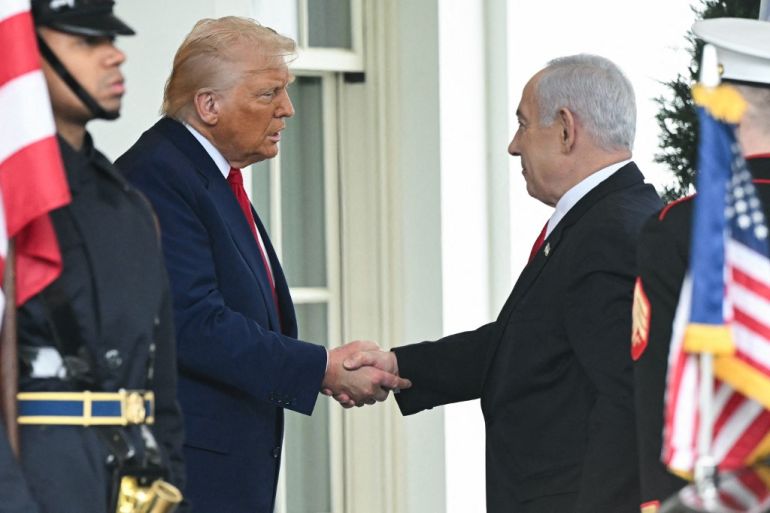Trump claims US has held direct nuclear talks with Iran
US president makes claim in an appearance in front of the press with Israeli PM Netanyahu, but also threatens Tehran.

Published On 7 Apr 20257 Apr 2025
US President Donald Trump has announced that direct negotiations with Iran over its nuclear programme have begun, after Tehran had previously dismissed Washington’s calls for the talks.
Speaking at the White House on Monday alongside Israeli Prime Minister Benjamin Netanyahu, Trump said discussions were already underway.
Recommended Stories
list of 3 items
Iran rejects ‘meaningless’ direct talks with US
end of list
“We’re having direct talks with Iran, and they’ve started. It’ll go on Saturday. We have a very big meeting, and we’ll see what can happen,” he told reporters. “And I think everybody agrees that doing a deal would be preferable.” He did not provide further details.
Trump also warned that Iran will be in “great danger” if diplomatic efforts to curb its nuclear ambitions fail, adding that Tehran “can’t have nuclear weapons”.
Earlier this month Trump told NBC News, “if they [Iran] don’t make a deal, there will be bombing”. He added: “it will be bombing the likes of which they have never seen before.”
Trump’s announcement was unlikely to be to Netanyahu’s “liking”, as the Israeli leader has long wanted to bomb Iran, said Marwan Bishara, Al Jazeera English’s senior political analyst.
Advertisement
“Trump has wanted a deal for a long time,” Bishara said. “Netanyahu certainly thinks Iran’s defences have been weakened by last year’s Israeli airstrikes on Iran. And he sees this as a great opportunity, with US support, for Israel to finish off Iran.”
“In reality, Trump doesn’t want to enter a war with Iran while he is in the midst of trade wars with the rest of the world,” Bishara added.
‘Meaningless talks’
Over the weekend Iranian Foreign Minister Abbas Araghchi described the prospect of direct negotiations on its nuclear programme with the United States as “meaningless”.
Araghchi’s remarks came after Trump said last month in a letter sent to Iran’s Supreme Leader Ayatollah Ali Khamenei that he hoped there would be a negotiation between their countries.
Tehran, which maintains that it is not seeking a nuclear weapon, has so far rejected Washington’s overtures, but has said it is open to indirect diplomacy – a stance repeated by Araghchi in Sunday’s statement.
In 2018, during his first presidency, Trump withdrew the US from the 2015 nuclear agreement between Iran and world powers, which had placed strict curbs on Tehran’s nuclear activities in exchange for sanctions relief.
Iran says its nuclear activities are solely for civilian purposes. Israel, the top US ally in the region, is widely believed to have an undeclared nuclear arsenal.
Netanyahu calls for Palestinians to leave Gaza
Speaking next to Netanyahu, who is wanted by the International Criminal Court (ICC) for alleged war crimes in Gaza, Trump suggested that the war in Gaza could soon come to an end.
Advertisement
“I’d like to see the war stop, and I think the war will stop at some point, that won’t be in the too-distant future,” Trump told reporters in the Oval Office. However, he did not provide specifics on how or when a ceasefire might be reached.
Netanyahu claimed that Israel was working on a new agreement following January’s temporary ceasefire, which he broke unilaterally in March before unleashing even more bombing on Gaza, killing hundreds more Palestinians. “We’re committed to getting all the hostages out, but also eliminating the evil tyranny of Hamas in Gaza and enabling the people of Gaza to freely make a choice to go wherever they want,” he said.
The Israeli leader also said he had discussed with Trump what he called the US president’s “bold vision” for Gaza, referring to a controversial proposal for American control over the enclave.
The plan, widely condemned as a blueprint for ethnic cleansing, has drawn sharp criticism internationally.
Luciano Zaccara, Assistant Professor in Gulf Politics at the Qatar University, said that the comments did not reveal any change in policy in Gaza.
“Both share the belief that fewer people in Gaza is better – for the United States and Israel,” Zaccara told Al Jazeera.
The word “ceasefire” barely came up in the press conference, said Zaccara, adding that “Trump’s main focus was business, trade deficits, and corporate deals, including with Israel. He was not paying much attention to Gaza as a whole, except when discussing expelling Palestinians from their land”.
Advertisement
US looks to mediate between Turkiye and Israel
Turning to Syria, Trump positioned himself as a potential mediator between Israel and Turkiye, despite tensions between Netanyahu and Turkish President Recep Tayyip Erdogan. “Any problem that you have with Turkey [Turkiye], I think we can solve, as long as you are reasonable,” Trump told Netanyahu.
“I have a very, very good relationship with Turkey and with their leader, and I think we’ll be able to work it out. So I hope that’s not going to be a problem. I don’t think it will be a problem,” added Trump.
Trump, who described Erdogan as “very smart”, praised Turkiye’s role in Syria, referring to the overthrow of the al-Assad regime in December. “Nobody has done in 2,000 years what Turkey has done in Syria,” he said.
Israel, which has carried out extensive airstrikes against Syrian military targets, remains wary of Turkiye’s growing influence in Syria.
Israeli officials fear that a permanent Turkish military presence in Syria could limit their air force’s operational freedom to attack Syria.
